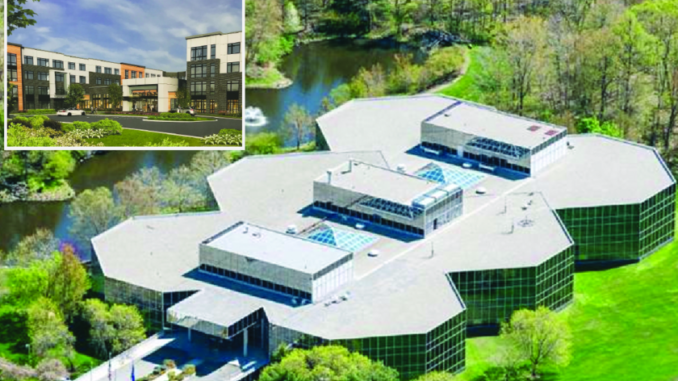
Editor’s note: After this story was published, Pascack Press learned the Feb. 24 hearing was postponed. We’ll update the story as soon as possible.
PARK RIDGE, N.J.—A new trial date was set for February by a Superior Court judge overseeing Park Ridge’s affordable housing settlement negotiations following the court’s decision to accept the method used by the borough to calculate its affordable obligations, according to Park Ridge’s special counsel.
It’s likely the trial will focus on what land is available for development in Park Ridge—known as the “vacant land analysis”—as well as how many affordable units Park Ridge must provide a “realistic opportunity” for development for between now and 2025.
State law requires municipalities allow for the reasonable creation of affordable housing, and Park Ridge continues to negotiate alternatives to a private land owner’s proposal to develop the former Sony Electronics campus into a large-scale inclusionary housing development, which would provide one affordable unit for every four market-rate units.
Attorney Scott Reynolds, borough special counsel, said all parties—including Park Ridge, Fair Share Housing Center, and Hornrock Properties, owner of the Sony site—should soon receive a final decision by Superior Court Judge Gregg Padovano outlining specifics of how an affordable housing formula created by Judge Mary Jacobson’s March 2018 ruling affects local obligations.
The trial was tenatively set to begin on Feb. 24, said Reynolds.
Padovano is said likely to lay out pre-trial legal requirements and documents needed by the court before trial begins, said Reynolds.
He said the borough asserts that its plan satisfies the affordable housing obligation through 2025, although the judge will determine whether the plan correctly follows and implements all parts of the proposed affordable settlement.
At stake is whether development will be permitted on the nearly 30-acre Sony parcel, where intervenor Hornrock Properties has proposed up to 972 units, contending such development will enable Park Ridge to satisfy its affordable housing “unmet need”, a number which is still to be determined.
Several times, Reynolds told Pascack Press that “unmet need” numbers are “aspirational” and never a requirement. He said Hornrock Properties was not needed for the borough to satisfy its affordable obligations.
In mid-summer 2019, Park Ridge and Fair Share battled over which method of calculating affordable housing should be used; in addition, they argued over what land should be excluded from a vacant land analysis.
Previously, the judge set a September trial date, which was postponed to allow more time for research and filing of briefs.
Park Ridge sought to limit the scope of the trial, eliminating the so-called “gap period” 1999–2015 from review, but it appeared that was not permitted.
Much of the trial, Padovano said, is likely to focus on how Park Ridge developed its affordable numbers and what vacant land should or should not be excluded from its land analysis.
A lower vacant land analysis helps to limit future development and thus, affordable housing, he said.
Park Ridge’s current settlement plan allows for zero units of development on the former 30-acre Sony property, which Hornrock Properties contends can hold up to 972 housing units.
Meanwhile, seven adjacent acres of former Sony property in Montvale are approved for a 185-unit townhome development, including 37 affordable units, as part of its affordable settlement plan.
Hornrock, Fair Share Housing Center and Park Ridge have locked horns over potential development on the 30-acre property for over four years, with Park Ridge officials arguing the borough’s plan satisfies all housing obligations and Fair Share and Hornrock eyeing the property for high-density, multifamily development.
Park Ridge contends the 30-acre parcel should only be used as office space, despite Hornrock’s contention that the office market is no longer a realistic commercial option there, based on studies it has conducted.
Reynolds said it appeared that the judge was requiring 225 affordable units, whereas Fair Share has been demanding twice that number, he said.
He noted “unmet need” appeared to be about 80 units, pending the judge’s final written decision from the Dec. 19 case management conference.
He speculated that by selecting the Jacobson method to calculate affordable units and with an estimated lower “unmet need,” the judge may not view Hornrock’s offer to build affordable units as favorably had “unmet need” be calculated higher.
However, officials from Fair Share Housing Center reached Dec. 23, 2019, said the judge did not verify any numbers for Park Ridge based on the Jacobson method.
Joshua Bauers, a Fair Share attorney, said it was likely that the trial would focus on how Park Ridge used the Jacobson formula to calculate its affordable obligations, including its “realistic development potential” and “unmet need”.
Bauers said more will be known when Padovano’s written decision is reviewed. He noted that Padovano made no decisions about the vacant land analysis used by Park Ridge and he indicated that Fair Share had issues with it “based on regulatory and case law.”
He said that Fair Share Housing Center saw some parallels between vacant land analysis approaches in Englewood Cliffs [currently on trial for its affordable housing numbers] and Park Ridge.
“Our position is that the borough has satisfied its legal obligation to apply housing credits to satisfy part of its unmet need and is not required to use intervenors [Hornrock] to build more,” said Reynolds.
Based on invoices requested by Pascack Press, it appeared the borough has already spent hundreds of thousands of dollars fighting against so-called high-density overdevelopment, specifically Hornrock’s proposal.
He said that Padovano’s Dec. 19, 2019, decision to go with Jacobson’s affordable method was crucial to possibly saving the borough additional hundreds of thousands of dollars in legal costs to argue its case against Fair Share and Hornrock.
“I can’t really underscore how important this is for the borough to win this,” Reynolds said of Padovano’s decision to choose Jacobson’s method for calculating affordable units.
Outreach to Hornock’s attorney seeking clarification and comment was not returned by press time.
